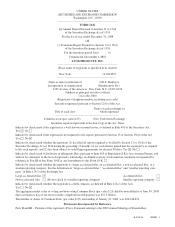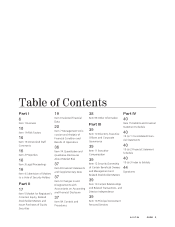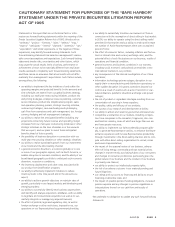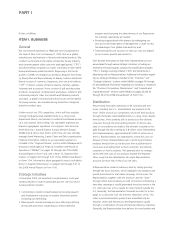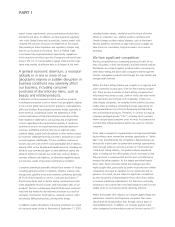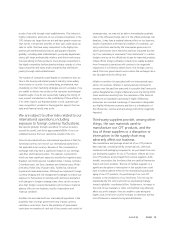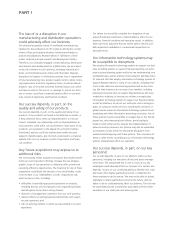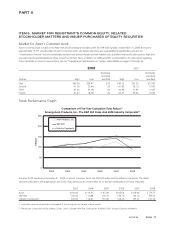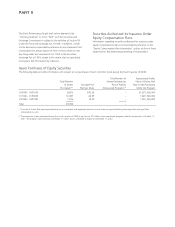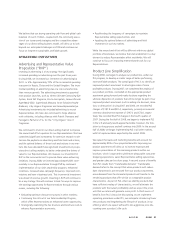Avon 2008 Annual Report Download - page 17
Download and view the complete annual report
Please find page 17 of the 2008 Avon annual report below. You can navigate through the pages in the report by either clicking on the pages listed below, or by using the keyword search tool below to find specific information within the annual report.We may not realize, in full or in part, the anticipated savings or
benefits from one or more of these initiatives, and other events
and circumstances, such as difficulties, delays or unexpected
costs, may occur which could result in our not realizing all or any
of the anticipated savings or benefits. If we are unable to realize
these savings or benefits, our ability to continue to fund planned
advertising, market intelligence, consumer research and product
innovation initiatives may be adversely affected. In addition, our
plans to invest these savings and benefits ahead of future
growth means that such costs will be incurred whether or not
we realize these savings and benefits.
We are also subject to the risk of business disruption in connec-
tion with our multi-year restructuring programs or other strategic
initiatives, which could have a material adverse effect on our
business, financial condition and operating results.
There can be no assurance that we will be
able to achieve our growth objectives or
maintain rates of growth.
There can be no assurance that we will be able to achieve profit-
able growth in the future or maintain rates of growth. In devel-
oped markets, such as the U.S., we seek to achieve growth in
line with that of the overall beauty market, while in developing
and emerging markets we have higher growth targets. Our
growth overall is also subject to the strengths and weakness of
our individual markets, including our international markets,
which are or may be impacted by global economic conditions.
We cannot assure you that our broad-based geographic portfolio
will be able to withstand an economic downturn or recession in
one or more particular regions. Our ability to increase or main-
tain revenue and earnings depends on numerous factors, and
there can be no assurance that our current or future business
strategies will lead us to achieve our growth objectives or main-
tain our rates of growth.
Our business is conducted worldwide
primarily in one channel, direct selling.
Our business is conducted worldwide, primarily in the direct-
selling channel. Sales are made to the ultimate consumer
principally through 5.8 million independent Representatives
worldwide. There is a high rate of turnover among Representa-
tives, which is a common characteristic of the direct-selling
business. As a result, in order to maintain our business and grow
our business in the future, we need to recruit, retain and service
Representatives on a continuing basis. If consumers change their
purchasing habits, such as by reducing purchases of beauty and
related products generally, or reducing purchases from Repre-
sentatives or buying beauty and related products in channels
other than in direct selling, this could reduce our sales and have
a material adverse effect on our business, financial condition and
results of operations. If our competitors establish greater market
share in the direct-selling channel, our business, financial
condition and operating results may be adversely affected.
Furthermore, if any government bans or severely restricts our
business method of direct selling, our business, financial
condition and operating results may be adversely affected.
Our ability to conduct business, particularly
in international markets, may be affected
by political, legal and regulatory risks.
Our ability to capitalize on growth in new international markets
and to maintain the current level of operations in our existing
international markets is exposed to risks associated with our
international operations, including:
• the possibility that a foreign government might ban or severely
restrict our business method of direct selling, or that local civil
unrest, political instability or changes in diplomatic or trade
relationships might disrupt our operations in an international
market;
• the possibility that a government authority might impose legal,
tax or other financial burdens on our Representatives, as direct
sellers, or on Avon, due, for example, to the structure of our
operations in various markets; and
• the possibility that a government authority might challenge
the status of our Representatives as independent contractors
or impose employment or social taxes on our Representatives.
For example, in 1998, the Chinese government banned direct
selling but, subsequently in April 2005, the Chinese government
granted approval for us to proceed with a limited test of direct
selling in certain areas. The Chinese government later issued
direct-selling regulations in late 2005, and we were granted a
direct-selling license by China’s Ministry of Commerce in late
February 2006, which has allowed us to commence direct selling
under such regulations. However, there can be no assurance that
these and other regulations and approvals will not be rescinded,
restricted or otherwise altered, which may have a material
adverse effect on our direct selling business in China. There can
be no assurance that we will be able to successfully transition
our business in China in connection with the resumption of
direct selling in that market and successfully operate using the
direct-selling model currently in place or that may be subse-
quently permitted in that market, or that we will experience
growth in that or other emerging markets. The introduction of
new channels in our business, such as the direct selling channel
in China, may also negatively impact existing sales. We may
encounter similar political, legal and regulatory risks in other
international markets in our portfolio.
We are also subject to changes in other foreign laws, rules, regu-
lations or policies, such as restrictions on trade, import and
A V O N 2008 11


